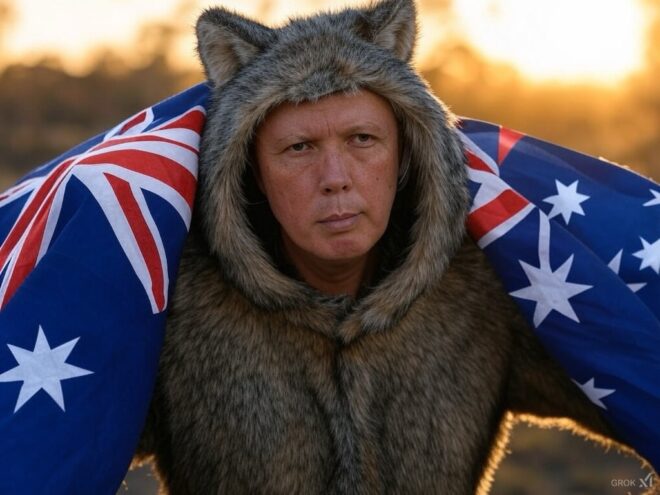
Aussie flag draped tight,
wolf howls of patriot love –
truth hides in the mask.
Introduction
In the ever-evolving sphere of Australian politics, few figures have sparked as much debate and controversy as Peter Dutton. As a senior member of the Liberal Party and the current Leader of the Opposition, Dutton has long been a polarising force, with his political strategies drawing sharp critique from some and steadfast support from others. Critics contend that Dutton prioritises personal ambition over genuine leadership, using divisive narratives to propel his political goals. They argue that his opposition to the Indigenous Voice to Parliament and his controversial rhetoric around Australia Day amplify societal rifts for his own advantage. Supporters, however, view him as a pragmatic leader tackling tough issues in an environment where decisive leadership is paramount. This analysis delves into both perspectives on Dutton’s political tactics and motivations, presenting a balanced view of one of Australia’s most contentious leaders.
The Critique: Ambition Over Principles
Accusations of Self-Interest
Detractors argue that Peter Dutton’s political decisions are motivated more by self-interest than by a commitment to serving the Australian people. His staunch opposition to the Indigenous Voice to Parliament, an initiative designed to give Indigenous Australians greater influence in shaping legislation affecting their lives, has been a focal point of division. Dutton claims his stance defends national unity, asserting that the proposal risks fragmenting Australia’s social fabric. Yet, many interpret his position as a calculated strategy aimed at resonating with particular voter groups uneasy about progressive reforms.
Critics assert that Dutton’s rhetoric serves to energize a base that feels threatened by change. By framing discussions around the Voice as an existential threat to national unity, Dutton positions himself as a defender of traditional values, thus appealing to those who may feel alienated by contemporary discussions on race and identity. This perspective frames Dutton’s rhetoric as intentionally polarising. By casting debates on issues like Australia Day as battles between “patriots” and “progressives,” critics suggest that he exploits existing societal tensions to boost his political standing while alienating marginalized communities and undermining broader societal cohesion.
Fomenting Division
Research has underscored the dangers of divisive political language in deepening societal rifts. A study from the Australian National University highlights how influential political discourse shapes public opinion and exacerbates divides. Dutton’s use of language steeped in nationalism and references to perceived threats from progressive movements can be seen as a deliberate strategy to strengthen support among segments of the population uneasy with rapid change. To critics, this reveals a leader more focused on leveraging division for political gains than fostering a unifying vision for the nation.
The accusations against Dutton also extend to his handling of social issues. For example, his framing of debates around immigration and national security often invokes a sense of urgency and danger, suggesting that those who advocate for more progressive policies are naive or out of touch. Such tactics not only alienate those who advocate for a more inclusive approach but also contribute to a climate of fear and division that detracts from meaningful dialogue.
The Defence: Pragmatism in Complex Times
Addressing an Evolving Australia
On the other hand, Dutton’s supporters argue that his positions reflect a necessary realism in navigating Australia’s complex political landscape. They claim his opposition to the Voice to Parliament stems from a genuine concern for maintaining national unity and preventing unintended consequences. Proponents argue that the Voice risks creating a fractured framework where one group’s priorities might overshadow those of the broader community, potentially triggering discord rather than reconciliation.
Supporters also contend that Dutton’s focus on preserving national traditions, such as his stance on Australia Day, demonstrates a commitment to safeguarding cultural heritage and reinforcing national identity. In an era where globalisation and multiculturalism reshape societies worldwide, many view his focus on tradition as a counterbalance to what they perceive as an erosion of shared values. Far from being divisive, this perspective positions Dutton as a protector of his constituents’ interests and concerns during a time of sweeping change.
Evidence of Effective Leadership
Political observers have noted that strong, decisive leadership – even if polarizing – can resonate deeply with voters. Dutton’s readiness to tackle contentious topics may appeal to those who value clarity and directness over compromising consensus. A study by the Lowy Institute found that Australian voters often gravitate toward leaders who take bold, unequivocal stances, particularly on issues of national importance. Supporters argue that Dutton’s leadership style reflects this calculated approach, appealing to a base that appreciates strength and conviction in navigating politically charged terrain.
Moreover, Dutton’s critics may overlook the fact that many voters feel disenfranchised by traditional political discourse, which often seems out of touch with their concerns. By addressing issues that resonate with these voters, Dutton positions himself as a voice for those who feel their perspectives are marginalised in contemporary political discussions. His supporters argue that his approach is not merely about division but about bringing to light the issues that matter to a significant portion of the electorate.
Conclusion
Peter Dutton’s role in Australian politics continues to provoke fierce debate, embodying the complexities of leading in a diverse and often divided society. While his critics decry a pattern of self-serving and divisive politics, his supporters frame him as a pragmatic leader responding to difficult challenges with clear-eyed realism. Ultimately, Dutton’s political legacy will hinge on how Australian society evolves and how his brand of leadership is perceived in the years ahead. As the nation wrestles with questions of identity, unity and progress, one key question remains: Is Peter Dutton an opportunistic figure sowing division or a strategic leader navigating turbulent waters? Time alone will provide the answer.
Peter Dutton’s political aspirations reveal a multifaceted character, one that can be viewed through various lenses depending on the observer’s political beliefs and values. His ability to polarize opinion speaks to the broader challenges facing contemporary politics, where leaders must navigate the treacherous waters of public sentiment, identity politics, and the quest for national unity in an increasingly complex world.

